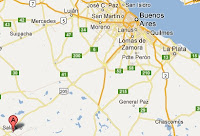Brace yourselves, Earthlings. Agriculture is poised to let you down.
Consider bread. Even at its most lowely, is hard to replace. Be it the gleaming white baguette, coarse peasant whole grain, bagels, pita, pizza, or pan lacteo, it is practically in our genetic memory.
As the gluten-intolerant can tell you best, that spongy crunchy loaf is difficult to replicate without the staff of life ...although billions are spent trying to do it or trying to convince us a suitable substitute has been produced.
Not only does it hold a place on our slow-cookin' tables and our faster food joints, it is central to Old World customs, superstitions and religions.
Here in Argentina, it should be no surprise that some of the world's great bread can be found. The French composed a notable percentage of the great waves of immigration to these shores in the 19th and 20th centuries ...and you can still find their lingering skills here if you know where to look.
Not that you´ll ever do it ...but if you ever find yourself cruising south of Buenos Aires on Provincial Hwy. 205, stop anywhere in the town of Saladillo.
The culmination of wheat, water, wood and wherewithal in that French-settled burg produces bread that will astound. If you're in a hurry, just stop for a choripan at the open-air parrilla by the rotonda. I guarantee that you won't complain there's too much bread.
Argentina is a major breadbasket for planet earth and has been for more than a century. Although 21st century exports have been spotty, exports will drop by 55% from last year. We´re still in the top ten for 2013, though:
Keep in mind though, many countries produce wheat but few export it to any great degree. Most wheat growing countries can't grow enough to satisfy their own population. You're looking at the lucky ten when it comes to daily bread.
Still, that's lot of exports, no? I guess the question should be, "compared to what?"
Well, let´s look at the same Top Ten compared to last year:
That's a lot of red ink there. It might turn out to be even worse with The Ukraine announcing yesterday that they will substantially curtail their exports. You can see Russia and Argentina doing the same thing.
Weather plays a big role in the drop.
Australia's drop is due to drought ...like Russia, Kazakhstan, and Ukraine. Argentina is coming-off one of the wettest winters on record after one of the it's driest summers ...too dry for good production, too wet to get machinery into the fields for good harvest.
Along with the weather, however, comes protecting supplies.
Curtailing wheat exports by law is just human nature in the face of shortage. After all, it´s natural to sell your extra stuff to other people ...but when you are running short of those same things, it´s natural to stop even if those other people are driving the price of your stuff through the roof.
If your spouse loves bread, for instance, you could catch some serious hell if you sell all of it ...no matter what your neighbor paid you!
But protecting your supplies can be very tricky for the guy who actually makes/grows those supplies. When Argentina started restricting/prohibiting the export of wheat, many wheat farmers were caught with no internal buyers (we had too much wheat internally) at the same time that those farmers were cut-off from their traditional external buyers.
It took 2 or 3 years ...but many Argentine wheat growers have decided to plant something else, something that is not export-restricted.
It´s not always export restrictions that cause that scenario. Often, in famine stricken countries that receive foreign relief shipments of grain, the free food causes grain farmers to go out of business ...the relief to the general population kills the last few farmers that need to charge for their produce.
But isn't there any wheat in storage?
Sure there is! The dawn of civilization can be traced to the first time large groups of humans started to put aside extra supplies of grains. However, the mentality of just-in-time supply chains and globalism and burgeoning world population has contributed to declining stores of grains:
The stocks of grains on this graph are down from years prior to 2002 ...and now we're getting into critical territory. The green eating-line is going up at the same time the orange harvest-line is dropping ...at the same time the bar representing how much we have in storage is low.
This is bad news for everyone outside the Top Ten grain exporters ...but it could be bad for everybody.
It´s a push-me pull-you world now in agriculture. "No corn? Feed them wheat." "No wheat? Feed them barley." "No barley? Feed them rice."
When there's a shortage of all of them at the same time, however, you are looking at a world we haven´t seen for a very long time.






1 comment:
Saladillo is my second home! Do drive the 185km on the 205. I have always been amazed by the many pandarias throughout the town....So has my panzito!
Post a Comment